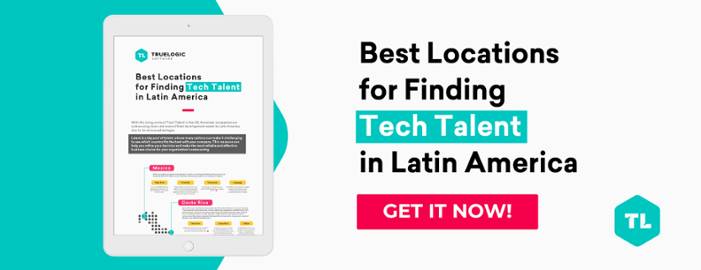Demand for capable software engineers is higher than ever, and it’s only going up. Every business out there requires technical solutions, and, combined with the limited life of code, a constant inflow of innovation becomes a necessity. The emergence of new platforms and tools is also a double-edged sword: it can make an old system outdated and in need for refactoring; but at the same time, implementing these solutions to reduce workload can invite more ambitious and complex projects, and increase workload instead.
This demand translates into an arms race to hire and retain the best talent in the market - attractive pay, ever-expanding benefits packages, accommodation for remote and part-time work, you name it. A growingly interconnected word also opens up the possibility of exploring foreign job markets.
At Truelogic Software, we’ve focused on the Latin American job market - you can download our free infographic detailing the main characteristics of developers in the region to share our insights.
How do I find and select the right software engineers for my team?
"Competing for tech talent never gets easier, nor is it a perfect mathematical equation. Instead, it’s about understanding your market, knowing what your current and prospective employees are looking for, and doing your best to create the environment that attracts the right workers to your company.” - Stacey Carroll, Principal Consultant at Payscale

1. First, know yourself
What’s good for the Ancient Greeks is good for any start-up today. The first step of your Hiring process should be knowing both what are your business’ necessities and attractiveness.
Zeroing in on your needs is crucial to be able to target the right people - not just the technologies and processes they are supposed to know, but what terms of employment you could offer. Sometimes a part-time contributor is the best solution, as some engineers are looking to spice things up with a new project, get more proficient with a tech stack they haven’t employed that much, or simply earn supplemental income.
At the same time, developing a good recruiting pitch for the attractiveness of your project is the cornerstone to get candidates hooked on your offer and committed to advancing your business. This should be a continuous process - as more people are brought to your team and your company scales up, you should find what people love about working with you and revisit your initial copy.
And knowing the competition is vital - there’s likely someone out there who can offer a bigger challenge, a comfier workstyle, or a larger paycheck. The unique value proposition you put forward to your candidates should resonate with that in mind.
However, it’s important to understand that every software engineer is different, therefore, finding the right perk just depends on who you’re interviewing. Some people might feel stronger about vacation benefits, while others might want those career development opportunities. In the end, it’s about finding someone who is compatible with your company so that your employee retention is improved.
2. Get creative when finding talent
The sources of prime candidates will change depending on your budget, the specificity of your needs, and the time available to make the hire.
Referrals are a great source of inbound candidates - with the additional benefit of offering your own employee’s seal of approval. Good financial incentives for referrals imply some expense, but it can certainly be worth the investment.
Placing ads on job portals like LinkedIn, Indeed, Angel can certainly help, as well as specialized job sites like GitHub, Stack Overflow, or WeWorkRemotely. That being said, they can be costly, and even the free options out there have payment options to highlight your ads.
However, it’s hard to stand out in this crowded job market - so sourcing talent externally remains a tried-and-true method to bring in new hires. LinkedIn is the main database to review and stands as one of the most effective ones. That being said, you can also browse GitHub users in your area that have been uploading repositories with the right technologies or find local specialized Slack / Telegram channels to post offers.
Physical events can be great opportunities to interface with prospects live - there’s probably a lot of active local software developer meetups in your area.
Hosting your own events can be a logistical challenge - yet they could provide a unique opportunity to showcase your offices, your work style, and network with people in the industry. Workshops and hackathons engage the natural curiosity of engineers and will generate an organic advertisement for your business in general.
3. Look beyond the resume
Work experience isn’t everything in a candidate. Your best bet is to find someone who’s had a considerable amount of software development experience beyond their work. For example, someone who was in a coding or hacking club in college, or who has attended more than one hackathon. These are the software engineers who are likely to be driven and innovative.
4. Pipeline dreams
The software engineer interview process for a software engineer should have multiple steps to assure that the candidate is both capable and fits into your company’s culture. At the same time, you want a lean, agile pipeline that can quickly identify talent - both for the sake of your own operational deadlines, as well as for the satisfaction of prospective candidates.
A great way to interview a software engineer is as follows:
-
Quick interview with your Talent team: Your non-technical staff should be able to identify which candidates fit your requirements with precision while keeping solid documentation to enable the possibility to recycle these candidates for future opportunities. The key to this step? Making sure your staff knows which parts of the job description and the offer are flexible, and which parts are set in stone. This will save considerable time and reduce back-and-forth chatter with the stakeholders.
-
Technical assessment: Practical and theoretical expertise of your candidates is perhaps the most important consideration in making a hiring decision. There are no shortcuts to this - even online testing platforms are supplemental to a comprehensive review. The two X factors to ensure this step is performed effectively is making sure your Technical Interviewing staff is very familiar with the job requirements, and that they can provide thorough feedback to make an informed decision. The candidates that miss the mark by an inch today may be just what you need tomorrow!
-
Meeting stakeholders: Tech leads, project managers, and even your clients may have a stake in deciding who will be the new acquisition for your team. As you may encounter many different (and sometimes conflicting) mindsets of what makes the perfect candidate, the best practice here is to document thoroughly all known pitfalls and opportunities. To set your candidates for success, it’s recommended to provide them with all the information they need to prep themselves and let their aptitudes and talent come to the forefront.
If you want more insights about software engineers in other parts of the world, such as Latin America, click here to download a free infographic detailing all the characteristics of developers in that region.
FAQs: Hiring Software Developers
What specific metrics or criteria should be used to evaluate "attractiveness" of a company or project to potential software engineers?
Tech professionals are being more selective about the companies they work with. More things come into focus such as competitive compensation, benefits, and professional development opportunities. There's more emphasis on work-life balance, projects utilizing the latest technologies, and alignment with personal career goals. A collaborative team environment, strong leadership, and the company's reputation and brand recognition also weigh in their evaluation process.
How can companies balance the need for a "lean, agile pipeline" for hiring with the need for a thorough and selective interview process, especially for senior or critical positions?
Partnering with staff augmentation companies like Truelogic will give you the agility needed to choose your senior engineers and integrate them into your projects. We've taken care of all the work for you and have expert tech professionals with experience in various tech stacks and development methodologies. But because the need for flexibility is essential, we offer different engagement models, meaning we have many ways to build your software engineering team in the way that works best for you.
What are the legal and compliance considerations for hiring and managing software engineers in different geographical locations?
Global hiring of software engineers necessitates careful consideration of legal and compliance matters beyond typical hiring procedures. Factors include adherence to diverse employment laws, tax regulations, immigration requirements, and data privacy regulations like GDPR and CCPA.
Consulting legal professionals or partnering with a PEO can assist in navigating these complexities. Additionally, understanding visa sponsorship and intellectual property rights is crucial to ensure a smooth and compliant hiring process. By addressing these aspects proactively, companies can mitigate risks and facilitate successful global recruitment endeavor.
